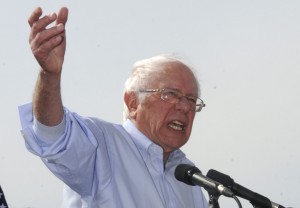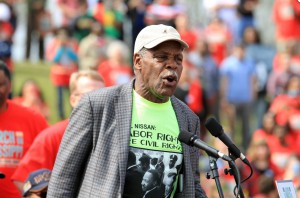After a long and often tortuous campaign, the United Auto Workers has filed for an election at Nissan’s sprawling assembly plant in Canton, Mississippi.
The campaign began nearly a decade ago but has been stalled several times by Nissan’s efforts to organizing the workers at the plant. The UAW said little about the petition for a vote but generally the union has not asked for a vote unless it has surveys among workers indicate a majority of the workers support the union.
However, the union faces several issues including the fact that a large percentage of workers in the plant are “temporary” employees, who are paid by an outside contractor. In the past, most of the support for the union has come from full-time employees, who have seen their terms of employment altered by the company.
Nissan officials, from CEO Carlos Ghosn down to supervisors in the Canton plant, have said the company does not need a third party to deal with issues about the company’s operations.
“While it is ultimately up to our employees who will represent them, we do not believe that UAW representation is in the best interest of Nissan Canton and its workers,” Nissan reiterated in a statement issued after the petition was filed.
(Nissan says “No” to UAW. To see more about organizing efforts, Click Here.)

Sen. Bernie Sanders spoke at a rally for UAW representation at Nissan's plant in Canton, Mississippi.
The union has struggled to organize foreign-owned auto plants across the South, working for years to build support for a vote among the 6,500 employees at the Mississippi complex. The union did score a partial victory when maintenance workers at the Volkswagen plant in Chattanooga, Tennessee, voted to unionize. However, VW production workers turned down union representation in an earlier vote.
The UAW and community allies also have pushed Nissan to stay neutral in a vote, claiming the company has intimidated workers. The labor board has backed some of those claims in pending litigation.
The pro-union campaign has sought to link support for the union with civil rights for African-Americans. Workers at Nissan’s plant in Smyrna, Tennessee, rejected the UAW in 1989 and 2001 votes, but no election has been held at the Mississippi plant in Canton. The Mississippi campaign has featured support from the NAACP and actor Danny Glover, as well as a rally in March headlined by U.S. Sen. Bernie Sanders, a Vermont independent and former Democratic presidential candidate.
“We see organized labor as a mechanism to give workers and African-Americans a voice around their quality of life,” said Derrick Johnson, president of the Mississippi branch of the NAACP.
(Click Here for details about how politics are creating a minefield for the auto industry.)
Hightower said the UAW asked to represent all production and maintenance workers at the Canton plant, a group that could include contract workers employed by two other companies — Kelly Services and Minact. Kelly traditionally employed a large share of assembly workers, but Nissan has moved more than 1,000 to its own payroll in recent years, increasing their pay and benefits.
The labor board would seek to schedule an election “as soon as possible,” Hightower said. However, she noted that pending unfair labor practice complaints filed by the UAW could block the vote. The UAW filed a new round of charges June 26.
Thirty percent of workers must sign petitions seeking an election. Hightower could not immediately say how many workers have signed.
“We have a pile of paper,” she said.
The move is likely to provoke a reaction from conservative political and economic leaders in Mississippi, who have long been hostile to unions. Republican Gov. Phil Bryant, who signed a package of bills intended to make unionization harder in 2014, is among those who have spoken out against the UAW. About 8% of Mississippi workers were represented by unions in 2016 according to U.S. Labor Department statistics, compared with 12% nationwide.
(Hoping to organize Southern car plans, UAW adopts pro-Trump stance. For the details, Click Here.)
“Nissan has been and continues to be a proven success story for the state of Mississippi and its workers,” said Scott Waller, interim president of the state’s chamber of commerce, called the Mississippi Economic Council. “Meanwhile, the UAW has struggled to hold membership. This would not be good for the state for Mississippi.”

